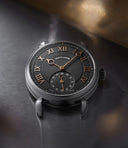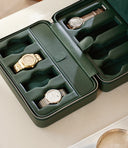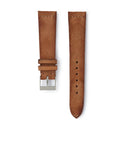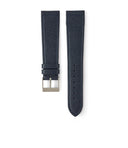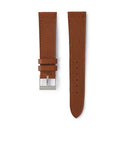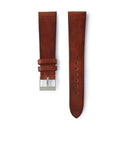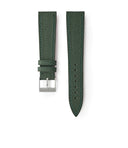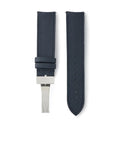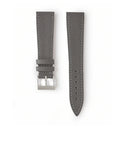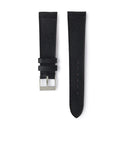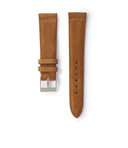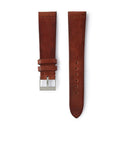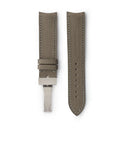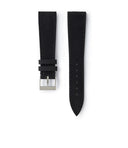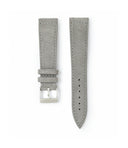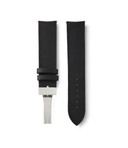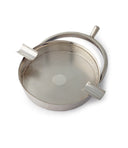
Interview: Jason Atherton
By Josh Sims
Jason Atherton is an English chef and restaurateur. He was the executive chef at Gordon Ramsay’s Maze in London – where he was awarded his first Michelin star – and opened his first restaurant, Pollen Street Social, in 2011, earning a Michelin star for that soon after. Atherton is based in London, but now has multiple restaurants operating under his name around the world, including in New York, the Philippines, and Dubai.
Atherton grew up in Skegness, a seaside town in England. At the age of 16, he joined the army, training for six weeks with the Army Catering Corps before he ran away to London. Coming from a humble background and working his way up the food chain, Atherton is no stranger to taking risks – for example, when opening his own restaurant group, The Social Company, he and his wife put their life savings into the endeavour, and even remortgaged their home. We spoke to Atherton about coping with stress, competition, and the British culinary scene through the years.
ACM: You recently downscaled your flagship restaurant Pollen Street Social to have fewer covers and become more a fine-dining, tasting-menu setup. In a market that seems to be driven increasingly by the business ethos of diner turnover, what was the thinking behind that?
JA: I’m enjoying being there much more now. I think that way I can express myself through my food a little bit better. I’ve done “numbers” for a long time and think I’ve probably got about 10 years of cooking left in me, [so I] thought it was time to up my game and push myself in culinary terms – and that’s the vehicle to do that. I’m super excited about it.

Atherton in his restaurant, Pollen Street Social.
Have you seen the 2021 film Boiling Point, directed by Philip Barantini? Is that an accurate reflection of the immense pressure faced by chefs at your level?
Yes, of course I’ve seen it. There are very few films with chefs in them – and I think Stephen Graham is one of the best actors of his generation, and a really nice guy – so of course chefs watch any chef film to see how they portray our world.
It’s dramatised; the film shows everything that’s wrong with this industry piled into one day, and probably gives a bad reflection of [it], but I think it highlights the pressure, just like the pressure among traders to make money in the City. They clock off [from work] at 6 o’clock and get on it, right? At least that’s what we’re led to believe. In the same way there’s this idea that chefs are all nutcases and when they’re not at work they’re doing 12 grams of charlie and 50 pints and running round the city like hyenas – and that’s just not the case. Actually, most top chefs are big family people. And the industry has changed a lot.

The interior of Pollen Street Social with mid-century modern furniture and loads of natural light creating a relaxed dining experience.
Do you think there is less stress for big chefs like you now, or have you always had to develop your own coping strategies?
It’s different to how it used to be. In one sense there’s more stress on chefs like me than ever before because right now we’re going through a staffing crisis, rising inflation, rising food prices and customers who don’t want to pay more – which I totally understand.
There’s stress not just in the work environment but, more broadly, the mental challenge [of dealing] with what’s been going on over the last decade [in terms of changes in the industry]. Staffing is a relatively new problem; you might think that coming out of Covid you’d reap the benefit of loads of people looking for new jobs, but loads of people have left the industry. With this government also shutting the door on people from continental Europe, the industry – in the UK at least – is really facing a perfect storm.


With so many factors to consider, it has become clear that the restaurant industry is undergoing a significant change.
I think there’s a misjudgment in understanding how important hospitality is to [the national economy]. After all, food is now an integral part of people’s holidays, for example: you don’t just book your hotel and your fishing experience, or whatever, you also book all your restaurants. But I don’t see how the industry is going to cope with all that’s going on now.
Another common misconception that popular media likes to push about chefs is that you’re all deadly rivals. You’ve spoken out against that idea before. Why is that?
It’s a competitive business, and which business isn’t, right? Nobody likes the idea of the competitor taking a chunk of their business. But it’s all healthy. My feeling is that if you’re doing a good job, customers will come to you.
I think that idea of rivalry came out of the days of Marco [Pierre White], Gordon [Ramsay] and [Peter] Hoffman, when having those [aggressive] behaviour patterns were much more part of [wider] society. There was more rivalry in football, as [there was] in cheffing. Now I think we all see the benefit of helping each other. It’s much easier to be disrespectful and discourteous than it is to commend and applaud someone that’s done well. It takes a bigger person [to do the latter].
No matter how good you are, how much money you’ve made, how many Michelin stars you have or how many restaurants you’ve opened, there’s always going to be someone who comes along who does more – and that’s just evolution. The person who can accept that is the person who can live in peace and benefit the industry in a much better way.

Atherton believes that evolution is key to the growth of the industry.
Unusually for a top chef, you didn’t grow up in a culinary home. What drew you to the work?
I was 14 when I really started to want to be a chef and I can’t pinpoint why. I didn’t have too many options, so I took that one. When I spoke to the careers officer at school he said that the army might be a good thing for me – for the discipline – but also suggested cheffing, so I joined the two together and joined the army catering corp. The army wasn’t really for me. I did my basic training and got out, never went back, but really wanted to continue cheffing. I realised that moving to London was the only way I was going to learn that properly because back in ’86 there weren’t many great restaurants around my hometown of Skegness, I can tell you that. And it hasn’t changed.
Did you learn much from the army that you applied in your later life?
Nothing, really. One of the things I really struggled with was not the discipline of the army way of life, but discipline more broadly. I got into four fights and spent two nights in prison in army barracks. You had the ‘red badges’ – the junior, trainee sergeant major types – and they were like a red flag to a bull. I liked to rumble. You’d take hours to press your clothes and polish your boots and they’d chuck them all on the floor. I understand now that that was all part of the discipline programme. They’re trying to stretch your mentality, to see what you can take. Well, unfortunately for me I couldn’t take that much. But when I got into cheffing in a Michelin environment that discipline made sense. Having discipline is an important part of success.
What makes someone like you borrow, remortgage your house and put all your savings on the line to open a restaurant?
It’s just the dream, isn’t it, to own your own restaurant. My wife [and business partner, Irha Atherton] and I wanted to have our own destiny in our hands. We didn’t want to be forced to do what others said – though “forced” isn’t fair, because Gordon [Ramsay] was very good to us and pretty much let us run our own affairs. But you want to build something using your own skill set, and see how far you can take it. It was very real of course, when you have so much on the line. When you’re two people who came from nothing and are already living a pretty decent life, earning decent money, doing OK, it feels even riskier. But we never had delusions of grandeur, never wanted to be flying our own jet – we were just seeing if we could create our own little legacy to pass down.
'No matter how good you are, how much money you’ve made, how many Michelin stars you have or how many restaurants you’ve opened, there’s always going to be someone who comes along who does more – and that’s just evolution. The person who can accept that is the person who can live in peace and benefit the industry in a much better way.'
But the process gave you anxiety attacks for years…
Absolutely I had anxiety attacks. And it still does [give them to me]. People see businesses and imagine they’re neverending streams of money. But business ebbs and flows. There are good times and bad times. They’re like marriages. It’s a lifelong commitment and can be tough. Too many people treat business flippantly. “Go into business and make loads of money!” But no, it doesn’t work that way.
We train all of our teams and the first thing we do when we put someone in charge is to ask them, “What is this restaurant?” And they’ll tell you “it’s a place to feed people”, or something like that. And we tell them it’s a business. The fundamentals of that is to be a commercial entity that buys something to sell at a profit. If you don’t make a profit, it’s a vanity project – and unless you have a personal fortune, you’re likely in no position to run a vanity project. We tell them that they have to take the business side of the restaurant very seriously or they’re not the right person for us.

A beautifully presented dish from Atherton’s kitchens.
There are so many chefs who say they don’t want to turn tables or who only want to work three days a week. Well, you know what, fucking good luck to you. Because if you find that magic number, give me a call and I’ll come and join you. In the real world business doesn’t work like that. Every restaurant is different. But every chef is a custodian of a business who has to understand the fundamentals of the mathematics that operate in that building. Get that right and you’re likely to make profit, then you’re also a businessman.
Why is it that so many chefs tend to have that obsessive personality type?
The problem is you’re constantly pushing for the ideal of perfection – which doesn’t really exist in a restaurant. You can have as many systems in place that you like, but there are too many moving parts, from the fact that every bit of fish or meat is different, which means recipes will vary, to, say, having different people laying up the tables. But having the ability to strive for that perfection is tricky because in the end what it pulls out of that person is making them obsessive about stuff. And that is the job. I never had that before, but after years of having to do what you have to do to get as close to perfection over and over, it’s what you end up being. I drive my wife mad because if I get my teeth into something – golf, for example, or boxing – I get deep into it. But that’s better than getting deep into alcohol or gambling. I still know right from wrong, but just can’t do things half-heartedly.
I know when a customer once complained and threatened to contact Michelin, you provided him with the address. Given the stresses, complaints must be hard to deal with.
Well, 99.9% of customers are lovely and appreciate all the hard work that goes into their meal. Every now and then you get the odd one who has a complete disregard for the industry, for how hard people work. It’s all about them – and to some extent it should be. But, by the same respect, we’re all human and people make mistakes – they spill a bit of wine or overcook your steak. Shit happens. And if you don’t understand that, then I don’t understand you. It’s a very human industry.
Do you think the UK’s poor culinary reputation is deserved?
Not now. But I think for a long time we in the UK were starved of good food. Everything was microwaved, supermarkets didn’t give a monkey’s – all the crap vegetables, out-of-season everything, packet food. There was barely anything fresh available and we all bought into that and followed the American fast-food diet. The UK was a culinary backwater then, I think it was probably my generation that started to discover good food, the gastropubs, with people like Jamie [Oliver] getting a lot of shit – which drives me nuts – because people like him on TV changed everything. This young guy at home saying it’s cool to cook your own food, rather than that hard kid attitude of being proud that you can only burn toast. Jamie changed all of that. That alone deserves a knighthood.
You’ve said that your first Michelin-starred restaurant, Maze, likely wouldn’t work if it opened today. What’s changed?
The industry is moving in a better direction towards more work/life balance – pay is better, hours, benefits, and that’s all super important. There’s always a yin and a yang, and those costs have to be passed on to the customer – there’s no two ways around that. And the idea of going out for a Michelin-starred lunch for £25 is long gone. I don’t want a medal for it, but [back then] I was certainly working seven days a week, 18 hours a day, then down to six for a long time. Everyone did it. It was the industry norm. You couldn’t do the covers we did then and win the accolades we did because you wouldn’t have the brigade behind you to do it now, even if you had the talent yourself. It was relentless. Lunch went into dinner, then it was a few hours at home, then back to prep, prep, prep and then lunch going into dinner again… That [way of living] couldn’t exist today. And shouldn’t.

“The UK was a culinary backwater then, I think it was probably my generation that started to discover good food.”
And we have different expectations from restaurants too, now, don’t we?
So much of the restaurant experience has changed. Look at three Michelin-starred places today and they’re playing hip-hop, you sit at a counter, it’s all very informal. That kind of place couldn’t have existed when I started training 30 years ago. Absolute zero chance. The industry has to change with the times.
Does Michelin matter any more?
I couldn’t believe it when I got my first star really, because I’d grown up working in Michelin-starred restaurants and so I was always very aware of the Michelin awards. Back in the day, there was no kind of ceremony – you just had to wait for it to be announced on the internet and sit there hitting that refresh button over and over. When we got it, I was like, “Fucking hell!” because we had some horrendous services there when we couldn’t get any food out of the kitchen, when there were big waits between courses. I think we deserved it eventually. But I was never going to give it back, of course.
Some restaurateurs don’t care about stars and actually it can hinder a restaurant if it means people come with the wrong expectations. And then you have those that only gear up to win Michelin stars, which seems to be the wrong way to go about it. You have to remember that the Michelin Guide isn’t for chefs, but for readers who want recommendations. And there are many ways of finding a fine restaurant these days – look at the World of Mouth restaurant app, for example. I think we’re going to see more of that [kind of restaurant assessment] with the next generation.

Looking beyond the Michelin star: Atherton thinks that communities and restaurant culture will continue to evolve alongside our society.
Do you think of yourself as a brand now?
The brand aspect is important because if you’re walking around a city and see our ‘dropped A’ logo hopefully that might lead you to check that restaurant out. And that’s the power of brands, right? But I’m a chef. I’ve lived a chef and I’ll die a chef. That said, why should it all die with me? A brand is something that can live on with the people who I work with, who have worked just as hard as me to make it happen, taking it forward to enrich their lives. We want to pass it down and hopefully those people can do very well out of it, as we have, and that’s a good thing, right?
Our thanks to Jason Atherton for taking the time to speak to us. Photography by Ollie Grove.



























































































